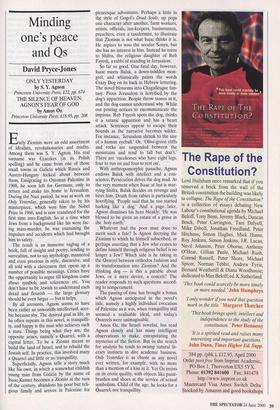Minding one's peace and Qs
David Pryce-Jones
ONLY YESTERDAY by S. Y. Agnon Princeton University Press, £22, pp. 674 THE SILENCE OF HEAVEN: AGNON'S FEAR OF GOD by Amos Oz Princeton University Press, £18.95, pp. 208 Early Zionists were an odd assortment of idealists, revolutionaries and misfits. Among them was S. Y. Agnon. His real surname was Czaczkes (in its Polish spelling) and he came from one of those small towns in Galicia which Russia and Austro-Hungary kicked about between them. Emigrating to Ottoman Palestine in 1908, he soon left for Germany, only to return and make his home in Jerusalem. During the Nazi period, he was at work on Only Yesterday, generally taken to be his masterpiece, which won him the Nobel Prize in 1966, and is now translated for the first time into English. So at a time when Jews from a background like his were fac- ing mass-murder, he was examining the impulses and accidents which had brought him to safety. The result is an immense ragbag of a book, full of insight and poetry, tending to surrealism, not to say mythology, mannered and even precious in style, discursive, and all told with a cleverness that opens up a number of possible meanings. Critics have the opportunity to argue till kingdom come about symbols and references etc. You don't have to be Jewish to understand each detail and flourish — the large glossary should be even larger — but it helps. By all accounts, Agnon seems to have been rather an unworldly intellectual, acer- bic because shy. The desired goal in life, as he often repeats in this novel, is tranquilli- ty, and happy is the man who achieves such a state. Things being what they are, the opposite arises, namely a Quarrel, with a capital letter. To be a Zionist meant to build the land of Israel, and to rebuild the Jewish self. In practice, this involved many a Quarrel and little or no tranquillity.
Superficially, Agnon tells a story much like his own, in which a somewhat childish young man from Galicia by the name of Isaac Kumer becomes a Zionist at the turn of the century, abandons his poor but reli- gious family and arrives in Palestine for picaresque adventures. Perhaps a little in the style of Gogol's Dead Souls, up pops one character after another, farm workers, artists, officials, inn-keepers, businessmen, preachers, even a taxidermist, to illustrate that Zionism is not what Isaac thinks it is. He aspires to woo the secular Sonya, but she has no interest in him. Instead he turns to Shifra, the religious daughter of Reb Fayesh, a rabbi of standing in Jerusalem.
So far so good. One fatal day, however, Isaac meets Balak, a down-trodden mon- grel, and whimsically paints the words Crazy Dog on its back in Hebrew lettering. The novel blossoms into Chagallesque fan- tasy. Pious Jerusalem is horrified by the dog's apparition. People throw stones at it, and the dog cannot understand why. While out posting notices to excommunicate the impious, Reb Fayesh spots the dog, thinks it a satanic apparition and has a heart attack. Sentences appear to escape their bounds as the narrative becomes wilder. For instance, 'Jerusalem shrank to the size of a human eyeball.' Or, 'Olive-green cliffs and rocks are suspended between the mountains and tend to fall but don't.' There are 'racehorses who have eight legs, four to run on and four to rest on'.
With anthropomorphic panache, Agnon endows Balak with intellect and a con- science. Persecution drives the dog mad. At the very moment when Isaac at last is mar- rying Shifra, Balak decides on revenge and bites him. Death from rabies is particularly horrifying. 'People said that he too started barking like a dog.' And a page later, Agnon dismisses his hero bleakly: 'He was blessed to be given an estate of a grave in the holy earth.'
Whatever had the poor man done to merit such a fate? Is Agnon decrying the Zionism to which he himself subscribed, or perhaps asserting that a Jew who ceases to define himself through religious belief is no longer a Jew? Which side is he taking in the Quarrel between orthodox Judaism and its transformation into Zionism? And the thinking dog — is this a parable about Jews, or a mere device, a conceit? The reader responds to such questions accord- ing to temperament.
The passing of time has brought a bonus which Agnon anticipated in the novel's title, namely a highly individual evocation of Palestine as it was, when tranquillity still seemed a realisable ideal, and today's Quarrels were unimaginable.
Amos Oz, the Israeli novelist, has read Agnon closely and has many intelligent observations to make, extrapolating the mysteries of the fiction. But in the search for analysis he tends to swamp natural lit- erary instincts in dire academic business. Only Yesterday is as chaste as any novel ever written, for example, with no more than a mention of a kiss in it. Yet Oz insists on its erotic quality, with objects like paint- brushes and shoes at the service of sexual symbolism. Child of the age, he looks for a Quarrel, not tranquillity.


































































 Previous page
Previous page